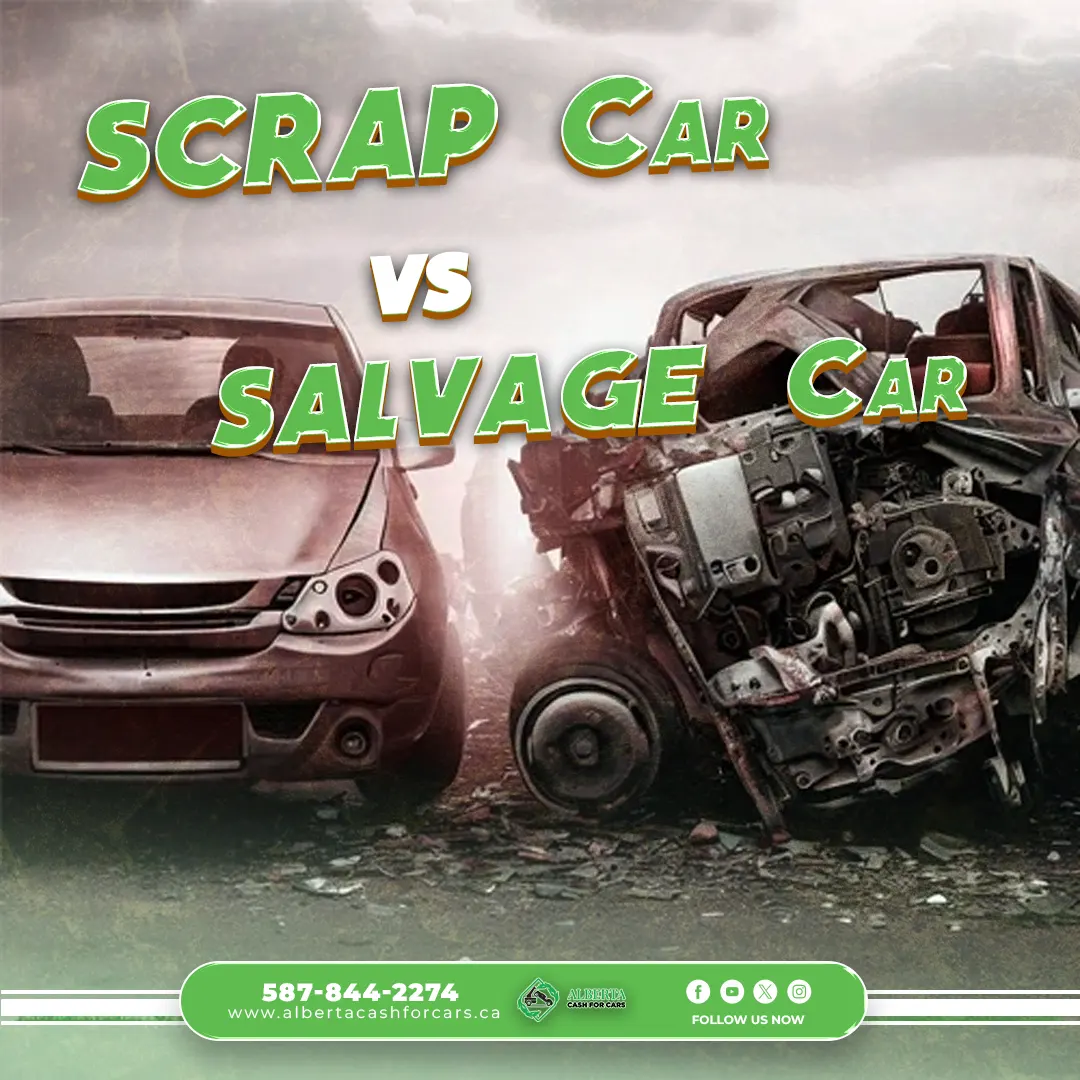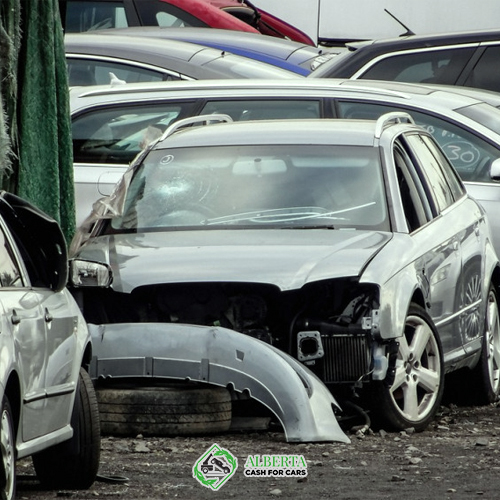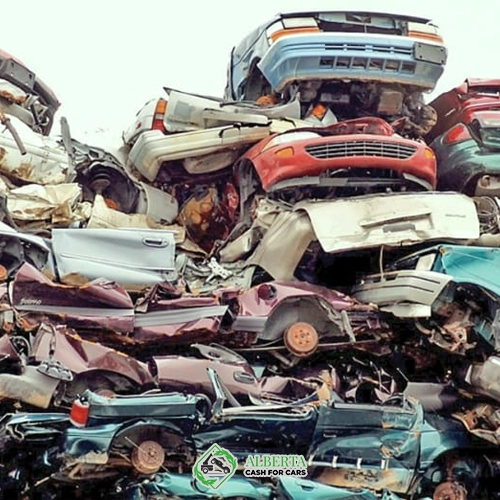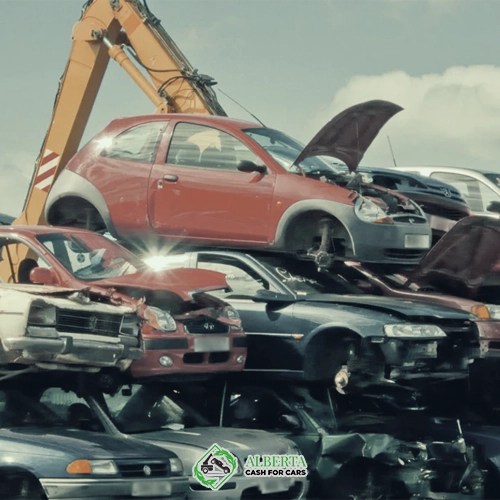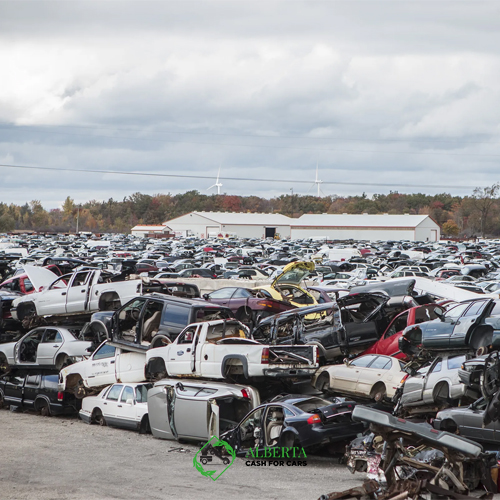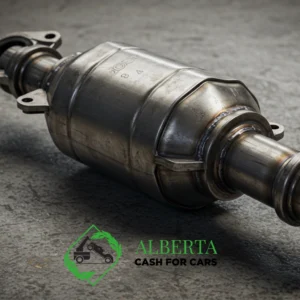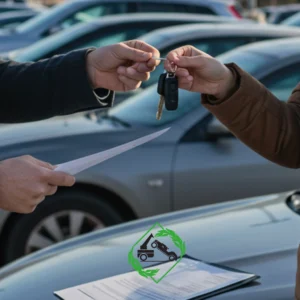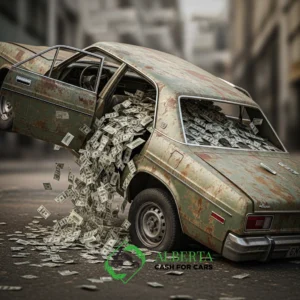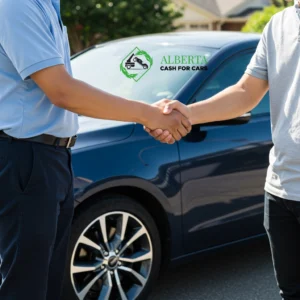Two choices are frequently considered regarding getting rid of an old or damaged automobile: Scrap Car vs Salvage Car. While the two procedures appear to be interchangeable, they have significant variations. In this post, we will examine the distinctions between Scrap Car vs Salvage Car and present a thorough overview of each choice to assist you in making an informed selection.
What is a Salvage car?
A salvage car is one that an insurance company declares a total loss due to substantial damage. Accidents, natural catastrophes, vandalism, and other situations can all cause this type of harm. Unlike junk cars, salvage cars are regarded as repairable and have the potential to be returned to safe-to-drive condition.
No Hassle, Just Cash — Book Your Free Pickup or Quote Today!
What is a Scrap car?
A salvage car, commonly known as a junk car or an end-of-life vehicle (ELV), is an automobile that is no longer working, has been severely damaged, or is considered beyond repair. These cars are usually in a state of disrepair due to mechanical problems, extensive body damage, age-related deterioration, or a combination of these. Scrap vehicles are considered unroadworthy and are primarily intended for recycling rather than repair.
Read Also: Reviving the Road | Exploring the World of Auto Salvage
So, What’s the Difference?
While Scrap Car vs Salvage Car are often used interchangeably, there are specific differences between Scrap Car vs Salvage Car. Understanding these differences can help you make the right choice when dealing with an old or damaged vehicle.
Here are the key differences between Scrap Car vs Salvage Car:
Condition and Repairability:
Scrap Car: A scrap car is typically in a non-operational or irreparable state. It may have severe mechanical issues, extensive body damage, or deteriorate due to neglect or age. The cost of repairs outweighs the car’s market value, making it impractical to fix.
Salvage Car: Conversely, a salvage car has sustained damage but is deemed repairable. It may have been involved in an accident, suffered from natural disasters, or undergone significant damage. While it requires repairs, it can be restored to a roadworthy condition.
Value and Market:
Scrap Car: The value of a scrap car is primarily based on its weight and the current market prices for scrap metal. Additional value may be assigned to valuable components that can be salvaged and sold separately.
Salvage Car: A salvage car holds some value based on its potential for repair and resale. It is often sold at auctions or through salvage yards. The extent of the damage influences the price of a salvage car, the car’s make and model, and the demand for salvage vehicles.
Title Designation:
Scrap Car: A scrap car does not typically have a specific title designation. Once it is designated as scrap, it is primarily considered as an end-of-life vehicle (ELV) and is destined for recycling.
Salvage Car: A salvage car receives a salvage title, indicating that it has undergone significant damage and has been repaired. This title designation alerts potential buyers that the vehicle has a damage history.
Potential Use:
Scrap Car: Scrap cars are generally dismantled and recycled for their metal content. The process involves draining hazardous fluids, removing valuable components, and crushing the metal shell for recycling.
Salvage Car: Salvage cars have the potential to be repaired and put back on the road. After necessary repairs, they can be used as functioning vehicles again, providing reliable transportation.
Insurance and Resale:
Scrap Car: Since scrap cars are typically beyond repair, insurance coverage and resale value are minimal. The primary consideration is the scrap value of the vehicle based on its weight and metal content.
Salvage Car: Salvage cars can be insured and have the resale potential. However, the salvage title may impact the car’s resale value, as potential buyers may be cautious due to its damage history.
In summary, scrap cars are non-operational or irreparable vehicles primarily recycled for their metal content. On the other hand, salvage cars have sustained damage but are deemed repairable and can be restored to a roadworthy condition. The decision between scrapping or salvaging a vehicle depends on factors such as the extent of damage, repair costs, potential resale value, and individual circumstances. Consulting professionals and evaluating the vehicle’s condition can help make the right choice.
What Should We Do with a Salvage or Scrap Car?
When you have a salvage or scrap vehicle, several options are available. The best course of action depends on the vehicle’s condition, goals, and legal requirements in your area. Here are some common choices:
Repair and Keep:
If you have the necessary skills, resources, and time, you may choose to repair the salvage vehicle yourself or hire professionals to do it for you. Remember that salvage cars require thorough inspections, careful repairs, and adherence to safety standards. Once repaired, you can use the vehicle for personal transportation or potentially sell it in the future.
Sell as a Salvage car:
If you don’t wish to repair the salvage car yourself, you can sell it as is to someone who specializes in rebuilding or selling salvage vehicles. Salvage car dealers or auto dismantlers often purchase such vehicles for their parts or to rebuild them for resale. You must disclose the salvage title and accurately describe the vehicle’s condition to potential buyers.
Donate:
Consider donating the vehicle to a charitable organization or nonprofit. Some charities accept salvage or scrap vehicles for various purposes, such as using them for training programs, selling them to fund their initiatives, or recycling them responsibly. Donating a salvage car can be a beneficial option if you’re interested in supporting a cause and receiving a potential tax deduction (consult with a tax professional for guidance).
Sell for Scrap:
If the vehicle is in a state beyond repair or the cost of repairs outweighs its value, you can sell it to a scrapyard or recycling center. Scrap yards typically purchase vehicles for their metal content, which is then recycled. You’ll receive payment based on the weight of the car and the current market prices for scrap metal. Ensure that you follow local regulations for selling and transferring ownership of scrap vehicles.
Recycle Responsibly:
If none of the above options are suitable, ensure you dispose of the vehicle responsibly. Contact local recycling centers or authorized dismantlers who can safely handle recycling. They will ensure that hazardous materials are properly disposed of and salvageable components are recovered before crushing the vehicle for recycling.
Before proceeding with any of these options, you must check your area’s specific regulations and requirements regarding salvage or scrap vehicles. Additionally, consider the costs involved, potential liabilities, and any legal obligations you may have as the vehicle owner. For more information about scrapping cars, refer to cash for cars Calgary .
Related Post:
Complete Guide for Auto Recycling process
Classification of Salvage vehicles
Besides the “what’s the difference between scrap or salvage cars” topic, here we talk about different categories of Salvage vehicles:
| Category | Description |
| Category A | There is no way to fix the car. The car must be crushed in its entirety. |
| Category B | There is no way to fix the car. Other components can be recovered from the body shell, which must be crushed. |
| Category C | Although the car could be fixed, it would be more expensive than the car was worth. |
| Category D | The cost of repairing the car would be less than its value. |
| Category N | Damage to the vehicle’s non-structural components can be rectified. |
| Category S | Damage to the vehicle’s structure can be fixed. |
Scrap vs Salvage – How much can I get?
When it comes to deciding whether to scrap or salvage besides the ” what’s the difference between scrap or salvage cars” topic, it should be said that the final price depends on the vehicle. This means that you may be able to get more money for a salvaged vehicle because the car has the ability to be repaired and used again, but this also depends on the cost of the repair versus the value of the car. In terms of making a profit from scrapped vehicles, it should be said that this issue depends on various factors such as the age and condition of the car, but in general, the price of a scrapped car is determined based on the weight of the vehicle.
When looking at a salvage car, you should know that you will most likely get more profit from the salvage car. So, according to the points we mentioned, the price of both options depends on the location of you and the vehicle.
How does salvage work?
We assure you that the process of saving your car is very simple and hassle-free. If you entrust this work to a team of experts with extensive knowledge, they can provide you with the best option and make sure that you get the best price for the car.
Why should I salvage instead of scrap?
In most cases, you’ll find that you get better deals if you go the salvage route. This is because scrap car dealers can make more money from your car parts than scrap metal.
Understanding salvage vs scrap
It is true that salvage vs scrap vehicles have a common feature, in that both are damaged or lost their function, but you should know that understanding their differences is necessary and necessary.
Scrap vehicles are at the end of their usable life and are sold because of their used metal value. But salvage vehicles have salvageable or repairable parts.
By understanding the salvage vs scrap, you can make informed decisions about selling your damaged car.
Key Difference with salvage vs scrap
You should know that when selling your car, you have to choose the buyer. Car breakers may be more willing to salvage your vehicle than vehicle recyclers. A buyer may also buy a damaged car if all its parts are complete.
An Automotive Salvage Yard
Auto salvage yards are commonly known as scrap yards, auto recycling centers, or scrap yards. Salvage yards buy damaged or unusable cars from previous owners. In order for a buyer to buy a car from you, it is not necessary for the car to be broken, you can just be tired of your car and it is an unwanted car for you.
Salvage yards place a high value on vehicles because the vehicle can be broken down into parts and resold. As a result, salvage yards buy cars at a much higher price than scrap metal yards.

